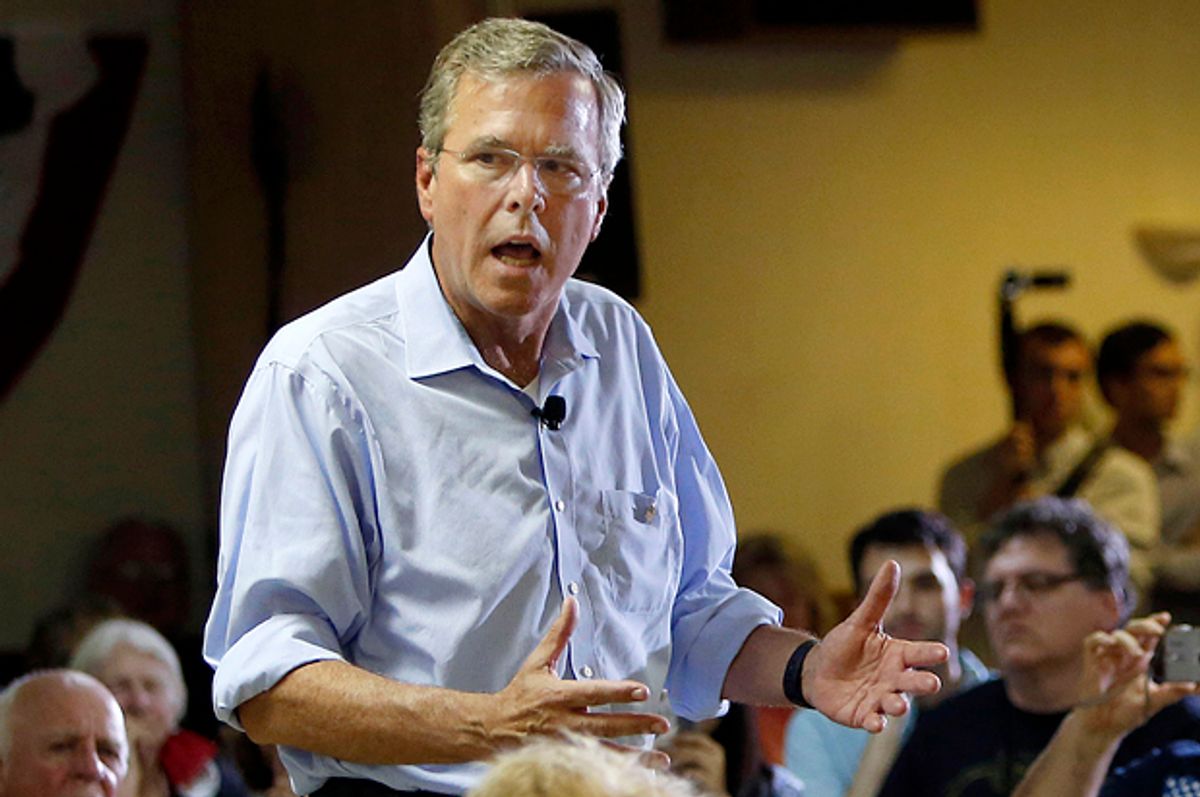The Jeb Bush vision for growing the American economy seems straightforward enough. It basically goes like this: Jeb is elected president, then he cuts some taxes and shows some “leadership,” and then blah blah etcetera etcetera four-percent annual growth for the foreseeable future. The details of how we arrive at this lovely sounding and thoroughly unrealistic sustained rate of growth have yet to be fleshed out, so for the moment we’re just supposed to take it on faith that there exists within John Ellis Bush a special form of economic magic that will be unlocked only when he is safely ensconced in the White House.
But Jeb offers us a reason to have that faith: he’s done it before. “We made Florida number one in job creation and number one in small business creation,” Jeb boasted of his gubernatorial tenure during his campaign announcement speech. “1.3 million new jobs, 4.4 percent growth, higher family income, eight balanced budgets, and tax cuts eight years in a row that saved our people and businesses 19 billion dollars.”
This is the core of Jeb’s pitch on the economy: he knows how to grow the economy at a blistering rate because he’s done it before. It’s largely nonsense.
The Washington Post’s Jim Tankersley has been assiduously picking apart Jeb’s economic boasting and trying to nail down just how much of Florida’s economic growth during the 2000s was Jeb’s doing, and how much was attributable to the state’s massive housing bubble, which popped shortly after he left office and left the state in economic ruin. Last month, Tankersley reported that “almost all of the gains [Jeb] talks up today, including three-fifths of the job creation, were wiped out in the four years after he left office, once the bubble burst.” This week he wrote a follow-up, looking at how the bubble that grew unchecked during Jeb’s administration ultimately “benefited rich investors at the expense of middle-class families.”
Jeb’s campaign, Tankersley notes, is trying to credit Jeb’s policies for the growth during his tenure, but won’t accept any blame for the devastation that came with the collapse of the housing market. His economic pitch is basically that he can replicate the effects of a housing bubble, but just without the nasty bubble part:
But economic analysis suggests that much of that superior performance — at least half of the difference between Florida’s growth and the nation’s — was driven not by any policy initiatives but by a rapid increase in housing prices. When those prices fell sharply, the state’s economy crashed.
It is a “huge stretch” for Bush to hold up Florida’s growth as a model for the country, said Stan Veuger, an economist at the conservative American Enterprise Institute who is not affiliated with any presidential campaign. “I don’t think you can replicate that growth, from a state with one of the hottest housing markets in the nation, in any sustainable fashion,” he said.
Bloomberg Politics also dug into Jeb’s dodgy economic rhetoric this week and found that he is wildly overselling the impact of his policies on Florida’s rapid growth: “When the effects of the bubble and population growth are taken into account, Florida probably still grew faster under Bush than the 3 percent rate at which U.S. economy was expanding at the time, but not by much and likely not because of his tax cuts.” Not surprisingly, Jeb is also exaggerating the extent to which he cut taxes as governor – he routinely claims that he slashed taxes by $19 billion over eight years, but arrived at the figure only by including savings from the phase-out of the estate tax at the federal level.
It’s important to remember here that Jeb doesn’t have some crazy, experimental economic policy pitch. He’s proposing the same raft of conservative economic policy prescriptions we’ve been hearing for decades: cut taxes on income and investments, slash spending, get rid of regulations, trust the free market, etc. Those policies didn’t produce sustained four-percent growth when other Republican presidents pursued them, but with some careful shading and flagrant exaggeration of his own record, Jeb is making the case that in his hands they’ll somehow become the most potent force for economic growth the country has ever seen.



Shares